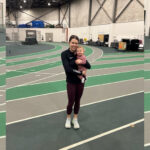By Olivia Chadwick
What does it mean to run as we age? It’s a complex issue — not only from a physiological perspective, but from a mental one as well.
I wear dual hats as a clinical exercise physiologist specializing in run coaching and a mental performance coach. When people ask about running later in life (at or after age 65), I know they are wondering about a lot of different things. How does their aging body affect performance? Do they need to train differently to avoid injury? Will they ever run a personal best again? These are important questions and grappling with them requires a good degree of self-awareness and resilience — qualities that are arguably the foundational skills to deal with any life transitions and challenges associated with change. So if you’re thinking about these things and I had to make a prediction about how you will manage running in later years, I would say you’re off to a solid start.
So let’s begin answering some of those questions.
Does my injury risk change as I age?
While we may perceive aging to be associated with a higher injury rate, there is no clear evidence to state this may be true. From a mechanical perspective, there are notable changes in the motor pattern of running associated with aging, but this doesn’t necessarily result in increased injury rates. Running has a high precedence of injury for participants of all ages, with 85% of injuries occurring in the lower leg. Most of these are chronic overuse injuries, which means they result from training errors versus mechanical ones.
Can I follow the same workout plan I used in college?
In working with runners from all backgrounds the biggest challenges I face — beyond helping people find their motivation to run — is teaching runners to listen to their bodies, trust the program, and take adequate recovery when warranted.
Aging bodies seem to require additional time to recover. You may know you need additional recovery time if it’s feeling harder to do workouts that once felt easy or if runs have become unenjoyable due to overall fatigue or a heavy-legged feeling. If you’re feeling this way and don’t take additional recovery time, it may lead to chronic overuse injuries. I know taking more recovery time can be difficult; it can leave you feeling like you’re slowing down or falling behind — especially if you used to be a six-day-a-week-type runner. One of the biggest challenges you might need to overcome as you age is your own ego.
If you are finding that workouts that once felt easy are feeling tough, consider doing the same types of workouts with more rest days in between. Taking more time off often means runs feel manageable and not too fatiguing, allowing you to feel more successful and your runs more enjoyable. Prioritizing your enjoyment is an excellent strategy for maintaining your running into later years as, over time, it will be more motivating to continue.
Do I need to strength train?
After the age of 35, we begin to lose muscle mass as a result of aging (sarcopenia). Most of us don’t really notice this decline until later in life when it starts to impact functional daily living; it may be harder to climb stairs or perform gardening tasks. While running may help to preserve some muscle mass in certain ways, it’s also a highly catabolic activity (causes muscle breakdown). This means that if we choose to continue running we may want to balance this activity with a healthy dose of strength training.
If you’re new to strength training, I recommend you consider Canada’s Physical Activity Tips for Older Adults. This is an evidence-based approach to aging well through movement and points out that just two strength training sessions a week can yield incredible benefits. I work with clients well into their 70s who only began exercising in their 60s and can attest to the incredible ability of the body to adapt and strengthen well into its senior years.
Why don’t more older people run?
Arguably the biggest influences of running and aging are socio-cultural.
Many people don’t expect to run later in life because there often aren’t role models who demonstrate this is possible either in your close circles or the mainstream media. Ageism and media representation is an issue here; as a culture, we need to do more to celebrate athleticism as we age.
Similarly, as many aging populations aren’t participating in high-impact sports and activities, you may find fewer friends to participate with. Having friends with whom to be active may well be the single most influential factor on our motivation, enjoyment, and ability to change our beliefs about exercise and aging. In many situations, you may be the pioneer who is modeling aging and exercise. Which — while admirable — it is, as they say, lonely at the top.
However I would like to offer a couple mental skill supports to help you move forward that I’ve found to be useful when working with older athletes:
- Establishing meaningful and age-relevant goals. Many people no longer confined to a 9-5 job intend to travel, which may involve a walking holiday or hiking adventure. Gearing your fitness towards these aims can be motivating and rewarding.
- Noticing age-related social narratives. Even as someone in my 40s I have noticed an increase in my peers using age to explain things they perceive as personal flaws such as not having energy to exercise or age-related sleep habits. Remember that your environment does influence your belief system. It can be helpful to notice that we may use age as an excuse to not address modifiable areas of our lives and subsequently shift our perspective. Perhaps we lack energy because we are caregiving more, not because we’re lazy or lack discipline. Perhaps we go to bed early because it’s a way to ensure we have enough energy to perform our responsibilities at work and home, not because we are old and boring.
- Focus on positive age-related experiences. Age comes with the loss of so many things. While acknowledging and grieving loss is important, so too is recognizing things we can appreciate, savour and have gratitude for. Perhaps aging has allowed you to slow down and enjoy the scenery while you run. Maybe you’ve become more inspired by how well your body can feel versus what it can achieve. Or you don’t worry about comparing yourself to others because your own journey has become much more important. Over time, running becomes a journey much less about outward achievement than about inward exploration.
Ultimately, we have no idea what’s possible for activity as we age. Every time we turn around someone is breaking age-group world records on the track in their 90s or completing a record-breaking marathon as a centenarian. These folks are super agers — and they typically aren’t achieving record-breaking performances by doing a record-breaking volume of training.
What makes a person a super ager is still unclear. Perhaps you will let us know when you get there.
Olivia Chadwick is a clinical exercise physiologist who specializes in run coaching and a mental performance coach. She is the host of The Wellness Compass podcast and co-host of The Compassionate Athlete podcast. Her first book, 16 Runs, is expected to be released this summer. Learn more at movement-medicine.coach.









